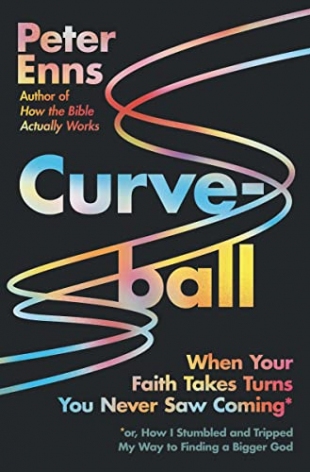Phyllis Tickle and other scholars of religion have theorized that every 500 years, there is a great upheaval within Christianity. Luminaries like Brian McLaren have tried to map the whys and hows of navigating an upheaval, noting that we are currently in the midst of one.
However, how much does this historical understanding actually impact the devout churchgoer, or the doubter who has stopped going? Curveball by Peter Enns speaks to both of these audiences and more, as it addresses what to do when experience challenges faith. Enns, who is known for his deep and nonetheless practical understanding of the Bible, mixes memoir and argument to convince Christians and Christian-adjacent individuals that change and deconstruction are all part of the tradition, and all part of the revolutionary message of Jesus.
If you’re not familiar with the term “deconstruction,” we should start there. The word has, in Christian circles, taken on some of the absurd complexity of “woke”: it can be spit with scorn or boasted with pride. It sounds a note of hope for some, a note of despair for others. I came across the term as a “trend” on Tik Tok, but I, like all queer Christians, had been deconstructing before anyone named it; when your church erects a wall between your experience and your God, you have to take a good hard look at the bricks.
In the tradition of Tickle and McLaren, Enns frames “curveballs,” or crises of faith, not as disruptions but as opportunities for faith to grow. Even more, Enns encourages us to see crises of faith as God-ordained; he muses, “God upsetting my view of God – isn’t that something?”
The book addresses many sources of faith crisis for 21st century Christians — everything from the insupportable doctrine of original sin to scientific discoveries and discoveries about the expressions of gender and sexuality. For each Enns offers a history of adaptation that begins with the ancient text and continues to this day. “And I can't stress enough,” he writes, “that the Christian faith is what it is because of the adjustments the New Testament writers made to their own ancient Jewish tradition. In other words, Christianity is not a purely Biblical religion but a living adaptive tradition of the ancient Biblical witness.”
Each time Enns outlines another part of the history of adaptation, the possibilities of Christianity seem more and more expansive and liberatory. As the United Church of Christ likes to say, “God is still speaking.”
And that God, Enns insists is, more than anything, mysterious: “Our creation is a cosmic curveball that challenges the notions of God we are familiar with rather than confirming them. . . . [W]e need a Creator God who outmatches the expansive, dynamic creation — a Creator who out-mysteries the mystery of the creation.”
This insistence on mystery restores to the divine a crucial element so evident in scripture and experience, and so absent in many religious institutions. “Looking back,” Enns reflects, “I am horrified that I was never taught to allow what we have come to know about the universe to bleed into my understanding of God.” To engage with this aspect of God, try these practices on X–the Mystery.
Enns’ writing is so accessible and practical that it is disarming. Curveball is at once a book for your conservative, evangelical uncle who believes in the “unchanging and inerrant Word of God”; your kids or grandkids who have decided church is irrelevant; and the church leaders who ensure its irrelevance, all while complaining about low attendance or the threat of deconstruction. It is for anyone who is afraid of the changing landscape of faith and anyone who desperately needs to believe change is on the horizon.
